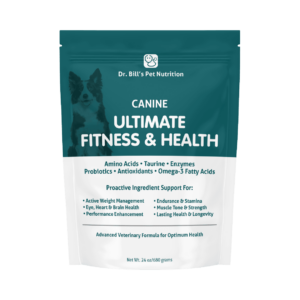
Taurine
— INGREDIENT —
Taurine is a sulfur amino acid known to play an important role in vision, brain activity, the nervous system and cardiac function.
Functions of Taurine:
- Taurine is an essential dietary nutrient for cats but dispensable in dogs consuming adequate quantities of sulfur-containing amino acids.
- Taurine is a non-protein metabolic end product of the amino acid L-cysteine
- Taurine is found in high levels in the brain, retina, heart, skeletal and smooth muscle, platelets and neutrophils
- Taurine is required in infant animals for normal retinal and brain development and may need to be supplemented if not adequately supplied in their diet
Taurine is extremely important in the cat (a true obligate meat eating carnivore) as it is primarily found in muscle meats, clams, oysters and some fish. Taurine deficient diets were shown to cause widespread blindness in kittens and dilated hearts in adult cats. Although Taurine does not appear to be as critical in dogs, under conditions of stress or disease the need for Taurine is increased and should be supplemented.
Taurine, unlike true amino acids, does not play a role in the metabolism of other proteins; yet, it is one of the most abundant free amino acids in specific tissues, including the brain, retina of the eye, skeletal and cardiac muscle and certain blood components. In the body, Taurine is synthesized from the essential amino acid methionine and its related non-essential amino acid cysteine.
Taurine is the second most abundant amino acid after Glutamine in the amino acid pool of muscle. Taurine is incorporated into one of the most abundant bile acids, chenodeoxychloic acid where it serves to emulsify dietary lipids in the intestine, promoting better digestion of fats.
Additional functions of Taurine include facilitating the passage of sodium, potassium and possibly calcium and magnesium ions into and out of cells and to electrically stabilize the cell membranes
Due to its ability to neutralize hypochlorous acid, a potent oxidizing substance, Taurine acts as an antioxidant that is able to defend against DNA damage caused by aromatic amine compounds. Taurine is a potent neuro-protectant, protecting against glutamate excitotoxicity, cerebral ischemia, oxidative stress, and the buildup of toxins including carbon tetrachloride and ammonia in the brain. As an antioxidant, taurine is used to quench hypochlorite secreted by leukocyte immune cells. Taurine also aids in osmoregulation, the maintenance of proper concentrations of ions, inside the cell. Taurine is also an insulin mimetic allowing for better glucose deposition into muscles, which may benefit canine athletic performance.
Taurine may be used in the treatment of congestive heart failure, including cardiovascular diseases, hypercholesterolemia, epilepsy and other seizure disorders, macular degeneration, canine and feline cognitive decline and various hepatic disorders. Taurine helps to regulate the heartbeat, is important in maintaining cell membrane stability and aids in the prevention of brain cell over-activity. Taurine comprises over 50 percent of the total free amino acid pool of the heart. As such, Taurine helps regulate the contraction and pumping action of the heart muscle while helping to regulate blood pressure and platelet aggregation. Taurine has a positive inotropic action on cardiac tissue and may be useful in the treatment of arrhythmias, especially arrhythmias secondary to ischemia.
NEW
Subscribe & Save
Save 10% On Auto Deliveries
Shop Now
Products with Taurine
Oops. We still need to add products here.
Glossary
No results found.


